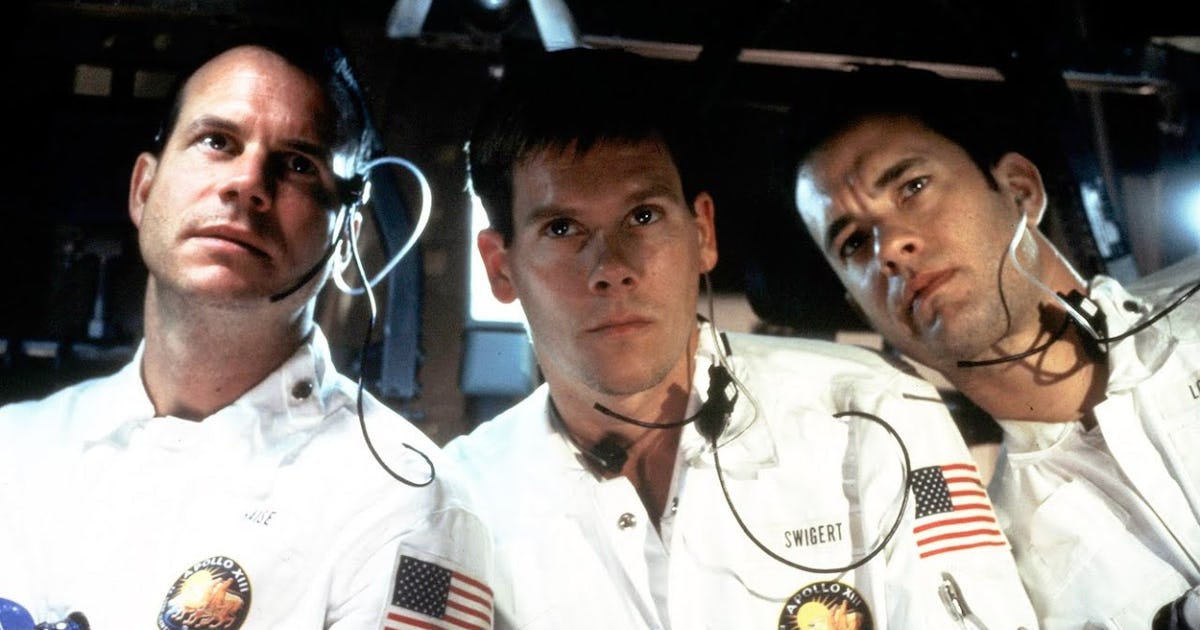NASA plans to put men on the Moon in 2027, a fact you’re probably unaware of. Artemis III would be the first time a human being sets foot on Luna since December 1972, but if it happens, the public will likely react with a collective shrug. While opinion polls show broad support for NASA as an institution, just 12% of Americans believe returning to the Moon (or sending manned missions to Mars) should be its top priority. In the public’s mind, NASA should be committed to research, development, and monitoring for dangerous asteroids, forever policing a void that no longer captivates us.
This disinterest is reflected in our science fiction. Before the Space Race, a trip to the Moon was an inherently marketable movie premise, while the Race itself provided plenty of dramatic fuel. But as the years passed and the Moon landings faded into history, merely going to space was no longer interesting — you needed aliens, clones, or Jedi to sell tickets. Recent historical dramas like First Man and Hidden Figures have offered exceptions, but both films, while successful, made less money combined than Apollo 13.
An elegy for an Apollo program that was already suffering from declining public interest, Apollo 13, which celebrates its 30th anniversary today, also proved to be a last gasp for the straightforward space thriller the program inspired. Starring Tom Hanks as real-life astronaut Jim Lovell, its straight-laced, earnest enthusiasm for its subject matter makes Apollo 13 feel like one of those old ‘50s space dramas, but with modern science and actual history to elevate the proceedings.
Apollo 13 is, in fact, obsessed with technical accuracy, albeit with the usual concessions to pacing, drama, and visual coherency. Much of the dialogue between the stricken spacecraft and the ground operators trying to save its fragile occupants is lifted from NASA transcripts; that is, it’s full of acronyms and other argot the viewer isn’t expected to understand, only recognize as the patter of dedicated professionals.
The movie, then, is anchored by Hanks, whose gee-whiz image recaptures a generation of astronauts chosen as much for their clean-cut profiles as their remarkable technical prowess. Introduced as a hardworking family man, Lovell orbited the Moon on Apollo 8 and is hoping to set foot on it before the program winds down. When Apollo 13’s crew needs swapped out, he jumps at the chance to lead a Moon landing, only for their mission to turn into a struggle for survival when, three days after launch, a freak explosion damages crucial life support systems.
Apollo 13 is based on Jim Lovell’s memoirs, although the movie takes a few creative liberties.
Universal Pictures
Lovell, Fred Haise (Bill Paxton), and Jack Swigert (Kevin Bacon), as well as Flight Director Gene Kranz (Ed Harris) and his team, must balance the competency that got them into space with the stress of a sudden mortal threat. Going into space is an inherently dangerous act, a fact emphasized by the movie’s repeated reminder that Apollo 1’s crew lost their lives before they even got off the ground, but the difference between the planned and the unplanned in space exploration is stark. Apollo 13 is structured like a survival thriller, with each problem solved leading to a new and even more pressing issue.
But amid the terrifying cascade of cause and effect, Apollo 13 is about a man who dreamed very big and fell agonizingly short. In its most moving scene, the stricken ship loops around the Moon so it can aim for home, and Hanks sells the complicated emotions of a man who wants to survive yet aches to touch something greater than him. Then, before the credits roll, Hanks wonders when we’ll return to the Moon, a question that still remains open. Budget cuts have left Artemis’ lofty ambitions in doubt, and now it may fall short too.
In real life, Fred Haise commented that space exploration “only seems interesting to the public if it’s the first exploration of another planetary body, or if you’re having a problem,” and indeed, the valorization of the Apollo program was something of a post-facto invention. Throughout the 1960s, a majority of Americans said Apollo wasn’t worth the money. The only outlying poll came when Apollo 11 landed. Three years later, NASA began to face budget cuts.
Our heroes have a tantalizingly close glimpse of the Moon.
Universal Pictures
A stretch of movies like Apollo 13, Contact, and even Armageddon appear to have given manned space exploration a temporary opinion bump, because Haise was right: Having a problem does make for one hell of a story. But with the end of the shuttle program, the rise of private space ventures, and the return of public apathy, Apollo 13 stands as a milestone. It ended a long era of space race blockbusters, but at least it did so with a bang.
Artemis may survive, and with other countries planning their own lunar missions, we may have another space race on our hands. This hypothetical one, however, seems unlikely to ever produce a film capable of scoring both nine Academy Award nods and a box office silver medal. That makes Apollo 13 feel like a product of its time, one that’s trying to capture an ever more distant period. But when Hanks, as Lovell, contemplates the majesty of the Moon, the whole enterprise still feels timeless.
Source link
Movies,NASA,Space Science,movies,nasa,space-science,entertainment,freelance,movie-tv-anniversary,inverse-recommends-movies,space,homepage,adex-light-bid,freelance-recs




Average Rating